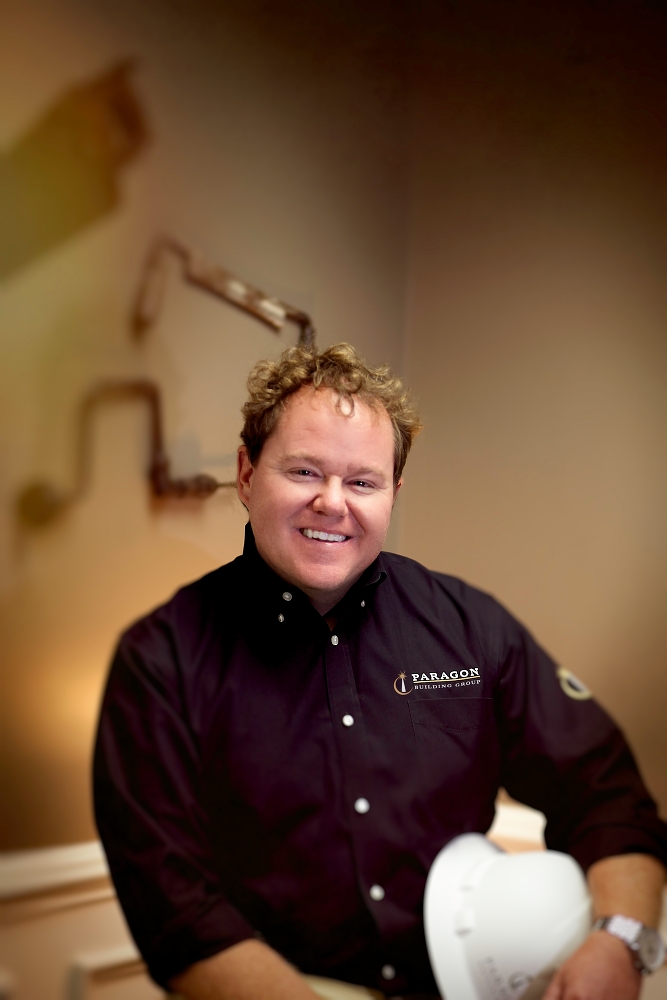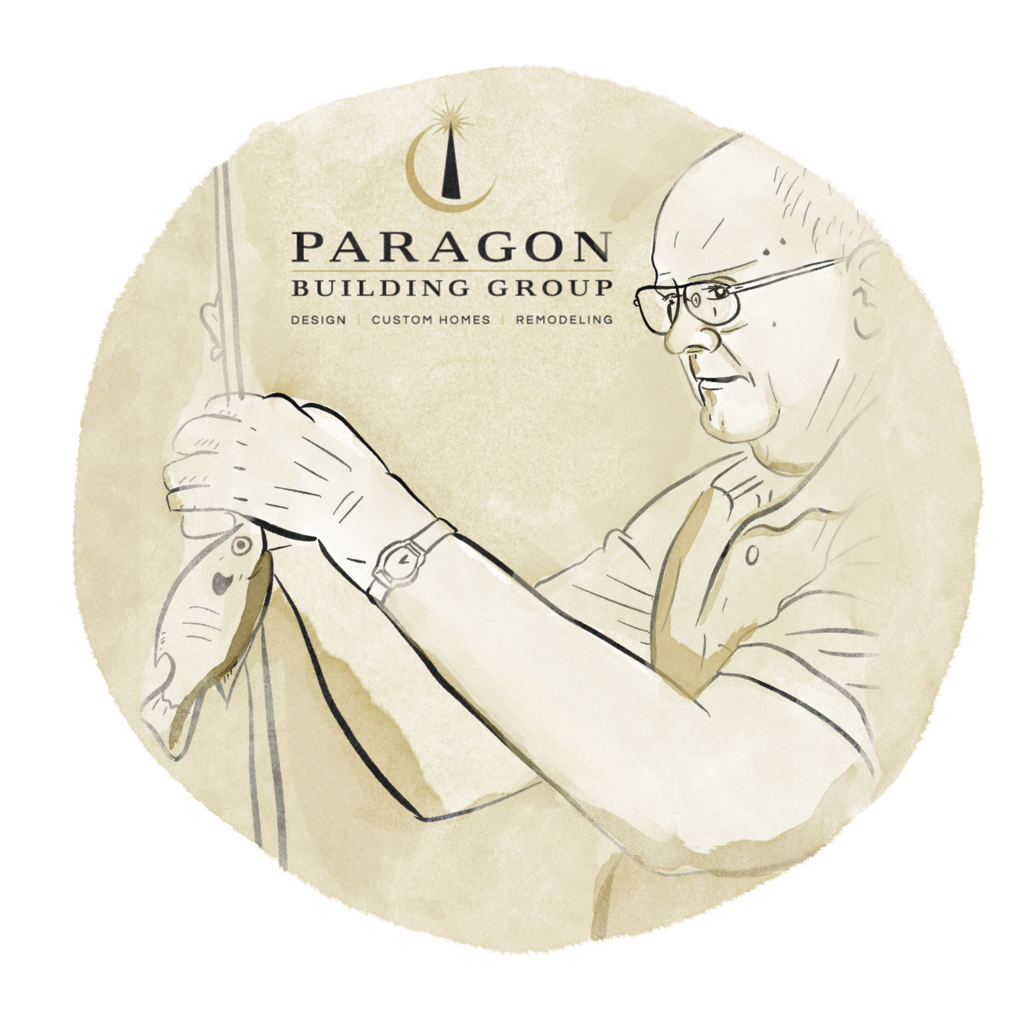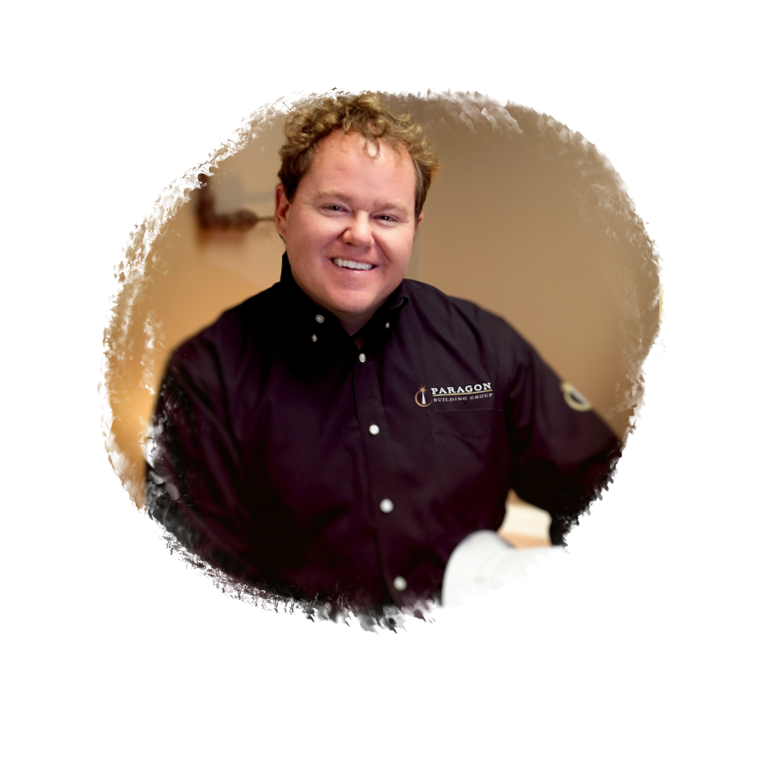As a builder myself, I am deeply proud of all that Poppy accomplished in a life of building projects – he built so many of the houses I grew up in and around. Being surrounded by a family filled with ideas about what made a home was such a large part of forming my view on building custom homes and my perspective working in new construction. And I’m proud to have made a family business out of my family tradition of building homes.

Josh Mauney is Paragon Building Group‘s Founder and President, a Graduate Master Builder, a CAPS (Certified Aging-in-Place Specialist), and has a passion for building Universal Design homes. Josh is the Raleigh area’s Southern Living Custom Home Builder, and was honored as 2019’s Young Professionals of the Year Award Winner for National Association of Home Builders.

Hi. I’m Josh, Founder of Paragon Building Group. Last week, I wrote about Poppy’s lifelong passion for helping people. If you haven’t read it already, I recommend reading that first, before continuing to read here. Today, we are talking about Poppy as a builder.
Poppy was never a builder professionally, but he built almost all of the homes our family lived in growing up.
For a living, Poppy ran the post office in Crouse, NC. But what I remember the most was that Poppy was retired forever. He was retired for longer than he worked. Poppy represents, to me now at 40, what it means to live a life without being confined by commitments or a work schedule. Poppy lived his retirement years by spending 99.9% of his time doing only what he wanted to do. And most of everything he did was less than twenty miles from where he’d always lived.
He developed a retirement life focused only on his joys: his passion and interest in connecting with people in positive ways. Part of that was as a builder of homes for his family. But that wasn’t all – he gardened. He fished. He enjoyed cooking for people, going to church, visiting with friends and strangers alike, sharing his bounty of veggies and fish, and also sharing his stories to everyone who wanted to listen. It was in doing these things that Poppy was happiest and the most genuine version of himself.
Like a lot of grandparents, Poppy had some stories he loved to tell. He’d love it more than anything if you’d sit with him on the end of his dock and fish, while he talked about anything. He was that kind of grandfather, friend and person. When I imagine sitting on the dock, it is sunset, and the light is rippling in the water. Poppy is laughing as he pulls a fish from the water, making some joke in the moment.
The only stress I saw Poppy experience was when he had to move out of his house due to his age and health. Before that moment, everything Poppy did was to build things. He lived in an environment full of friends, but with no social hierarchy. Everyone was all from the same place, a community of similar people, doing the things they wanted to do. That’s a different life than exists in the modern day. He built community through his food and his service and his kindness, but he also built houses. In fact, I grew up in houses that Poppy built.
In building a house, Poppy’s primary objective was to build at the lowest possible cost. He built houses himself, in part, because it was cheaper than hiring a builder. It was how he made it happen. If he’d needed others to do the work for him, he might not have done it.
When it came to living in a house while he aged, the fact that cost was the deciding factor in every design choice he made in building his home was a major problem. Everything was built for “now,” not built for the needs he would have later in life. And the small fortune that Poppy paid later in life for his care as an older man was directly related to the money he tried to save by cutting corners to keep immediate costs as low as he could while building his home. If you want to keep costs low, long term, you have to think about the future, about what is possible or likely, and plan ahead. Things change, and life isn’t always predictable, but you can always plan.
There weren’t really codes for builders back then either, so that might have added to his long-term problems. When he decided he wanted to build a house, he made a sketch of a simple rectangle on a piece of notebook paper, and that was all of the planning he did. In the modern day, we know that there needs to be a lot more advanced thought than that. When it comes to leading with cost, instead of planning, you might look at a standard sized door frame and see that it might save a few dollars today – but what if you need to use a wheelchair later in life? All of a sudden, paying a few extra dollars for a wider door frame really goes a long way toward keeping that house as an option for living in later years. A little thoughtful design will allow a house to adapt to your needs as your life change – and everyone’s lives change over time.
Poppy designed his house around immediate use. The house’s main bathroom was, strangely, right off the kitchen. After using the toilet, you’d open the bathroom door and immediately find yourself right next to the stove with food bubbling away on top. And all of the toilets were way too close to the walls, with no room for a toilet paper holder – all to keep the rooms smaller and cost down. His stairs were tiny, because his own feet were tiny and he used his feet to measure how wide a stair should be. He was building only for himself in the moment, not for his future needs, but also not for his family and friends who might use the space too.
He was so considerate and caring in so many ways, I think it just didn’t occur to him as a builder to design for more diverse bodies who might be using the space than literally his own, right now, as he was building. Those stairs would not be compliant with building code today – they are too narrow and dangerous, but because they were smaller and fit him then, they were also much cheaper.
I think he would have designed things differently in a heartbeat if he would have thought it would have enabled his friends to visit in later years, but he didn’t think of that and he never thought he’d need anything different for himself. Obviously, he was wrong. There were people who couldn’t visit. And, ultimately, Poppy had to move out of his home because he couldn’t use it at all. He had to leave. A little thoughtful design and increase in cost up-front would have made a huge impact over where Poppy spent his final years: in his own home, or in a sterile, unpleasant senior living center. You want your friends to be able to come over, always, and you’d like to plan to live in your own home, always and forever.
One of the unique things Poppy did that was unique-to-him but showed some thoughtful design and planning was his placement of light switches. If a stranger went into his house, they’d be confused about how to each switch connected to each light. Poppy had all of his house’s lights flow to a series of switches in the bedroom. He could turn off all the kitchen lights from the bedroom, so he wouldn’t have to leave the bedroom to shut lights off after he’d gone to bed. He could just turn them all off right there. He planned the space for how he wanted to work, and he wanted the last thing he did at night to make sure all the lights were off everywhere, conveniently and predictably (for him).
Another thing that was uniquely Poppy came from how he would source his building materials. A boyfriend of my aunt was a mason, so he had access to a quarry. Because of this, he built his house out of white stone brick from that quarry, from bricks that were locally sourced and cheap for him to buy. People gave him things they thought he could use, and he found ways to use them, even if they were unconventional. His friend, whose family ran Mom and Pop’s, a local store, gave him bags and bags of shoe string. Some people might think, what could a person do with string? But not Poppy; he always found ways to use it, to share it, to think others would find it useful too. The most prominent way I can remember the shoe strings being used was underneath the house, where he used them to suspend the house’s duct work.
So much of that was based on the good relationships he had with people. Poppy was willing to share everything he owned. So people wanted to find ways to reciprocate. And he, in turn, felt the need to find ways to use the things people shared with him. People wanted to help him, because he helped people.
The only hardship I ever saw on Poppy’s face was moving from this home he’d made himself. He’d made the house just right for him at the time he built it, but it grew to be so wrong for him as life changed. It was not possible for a builder to change the home he’d been in for more than 35 years to suit his needs, and if it had been possible, it would have cost well more than the house itself was worth. It was a bad situation. And while we couldn’t help Poppy stay at home, I think he would like knowing that we are helping others to stay at home, by using thoughtful design and well-planned spaces.
Poppy is our inspiration and our “Why” for so much of what we do.
Poppy wanted to help people, and he was a builder of family homes.
Poppy’s investments in things were really investments in people, and he always listened, always had time for people, and was always there when you needed something.
You always remember how people make you feel. You don’t necessary remember what people do or say. But you forever remember how they make you feel. I will remember how Poppy made me feel, forever.
With Poppy’s story in mind, both his kindness and his needs, we specialize in Universal Design, Aging-in-Place, and Multi-Generational Living. We care about our partners, vendors and workers. We care about everyone we’ve ever worked for over the years. And, we care about you, even if we have never met you. I look forward to continuing the conversation we have started here.
I’m honored to have given you an opportunity to have met Poppy, even if only through my words. He was a truly wonderful person, grandfather, and builder of custom homes. I hope, through my work, and through my life, that I am building on his legacy. I think he would be proud of me.
He would want us all to take care of each other, even as strangers. And I still, even after all these years in business, want to be just like him.
All of the above homes were custom built.
Each one depicted in a drawing was built by Poppy, except the final one, which I built in 2020.
In continuing the tradition Poppy began, we build homes for families to live in. If you’d like to see more about the home I built that is illustrated above: we call it Old Milburnie and we have a photo essay that will give you a tour of the space and the nature surrounding it. All the illustrations of homes here were created in-house, by Cari, my sister-in-law, who also creates our photo essays, and is our architecture photographer and resident artist.
I am honored to continue our family’s tradition, and to enter the traditions of families like yours through Paragon Building Group. Thank you for helping me, by being here and reading this, to honor Poppy’s legacy.


As a Graduate Master Builder, Josh is also holds a degree in Construction Management from ECU. As a person who has lived, worked, and studied his whole life in North Carolina, Josh is happy to call Raleigh home.
Call me when you are ready. Even if it is just to chat for a second or two, and even if you aren’t building a custom home at the moment, always feel free to reach out. I promise, you will be the only person in the world to me while we talk, and I will listen and learn how best I can help you in this very moment. When we talk, we’ll build something beautiful together, even (especially) if it is our connection as people that we are building. You are always welcome here at Paragon Building Group. We are in the business of helping people. Welcome Home.
Welcome.
You’ve found home.
Or, simply click here to call.
Or, inquire in the form below, and we’ll contact you shortly to get started with a consultation.
No matter what stage you are right now in the process, we look forward helping build beautiful spaces with Universal Design together.
Copyright © 2020 Paragon Building Group | Privacy Policy | Home | Web Design and Marketing by Paragon Building Group